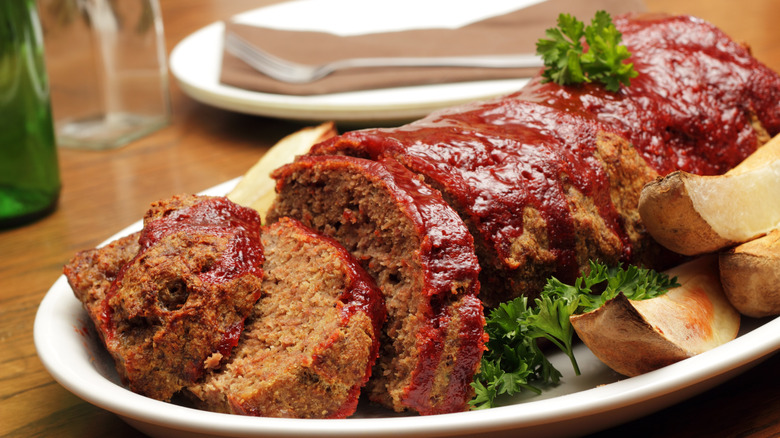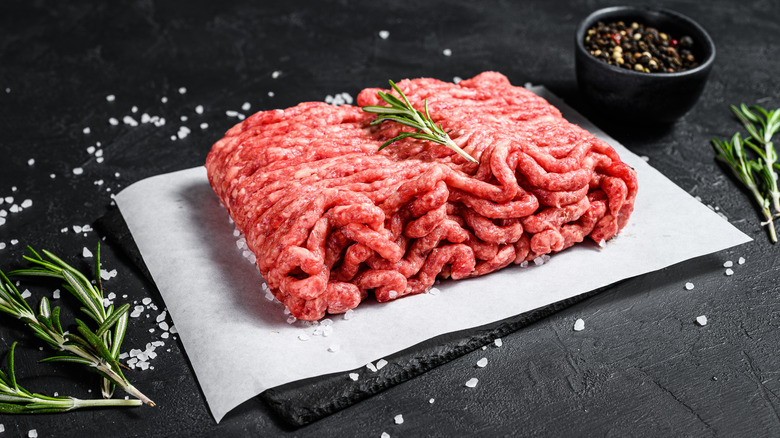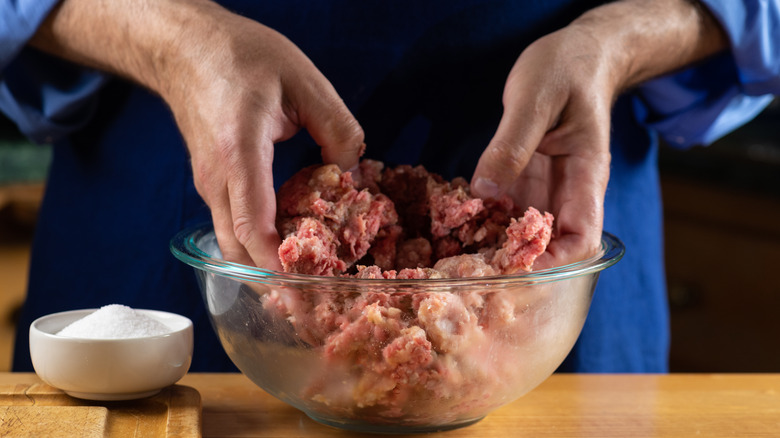The Beef Mistake That Causes Dry, Boring Meatloaf
If your meatloaf is turning out dry and unpalatable, and you're confident that you had a good recipe and followed it perfectly, there's probably nothing wrong with your technique. Instead, it's probably an issue with your ingredients, and the likely culprit is the type of ground beef you're using — specifically, lean, low-fat ground beef. Meatloaf tends to get its succulence and moisture from the fat in the meat, so if you remove that from the equation, you're running the risk of a mealy, dry meatloaf. The same also applies to other recipes too: For example, if you choose to make burgers with lean beef, chances are good that the burger mistake will make the meat equally dry. It comes down to choosing beef that can deliver juicy results.
Since the cause of dryness is a lack of fat, the same issue will also appear if you're using other lower-fat ground meats, even if they're not billed as "lean" on their packaging. The main culprits here are ground chicken or turkey; ground pork tends to be fairly fatty as long as you're not buying a lean version. The ideal solution to dry meatloaf is simply not to use lean meat in the first place: You should go for ground beef (or meat) with at least 15% fat. Ground beef is sometimes labeled with the ratio of lean to fatty meat, so if you're trying to decode those numbers, you want the 85/15 ground beef (meaning it's made with 15% fatty meat) or something with a higher volume of fatty meat, like 80/20.
Other fixes to try
If you're making a meatloaf recipe and you're stuck with lean beef (and don't want to go shopping for a fattier variety) or something like ground turkey, don't fret: Your meatloaf is not doomed to dryness. Since the main issue is a lack of fat, you simply need to add that fat elsewhere. An easy fix is to add a couple of tablespoons of olive oil to the meatloaf: The oil should be well-mixed into the meat before you shape and cook the loaf. Of course, any other oil should have the same impact, and theoretically, melted butter should work too. You could try other ingredients with fat in them too: Milk is one option (around ¾ of a cup for 2 pounds of beef, and avoid skim milk), or even a sauce with some oil or fat in it, like ketchup.
If your lean meatloaf is already cooked, there's really only a band-aid solution available: Douse it in or serve it with some kind of sauce. It's really up to your taste preferences: Ketchup or barbecue sauce could work, or if you're short on options, cooking oil (although it'd be wise to go for one with flavor, like olive oil, instead of something like plain vegetable oil). This won't really make the meat juicy again, since that ship sailed while it was in the oven, but it'll mask the dryness. Aside from that, all you can do is plan to not make that mistake again.
How to make it juicy without adding fat
If you're committed to using lean beef (perhaps for health reasons), there are some hacks to stop it from drying out that don't involve simply adding fat back in. One popular trick is to add a ½ teaspoon of baking soda for each pound of meat, as this is known to prevent moisture from escaping from the meat as it cooks. This tip is usually recommended for lean beef burgers, but there's no reason it shouldn't work for meatloaf. Adding oats is another trick (sub them in for the breadcrumbs if your recipe calls for those). This kind of starchy ingredient absorbs and holds the moisture from the meat, preventing it from draining to the bottom of the pan.
Some popular meatloaf recipes that feature lean beef also suggest adding other ingredients that bring moisture to the mix. The options vary: Peppers and zucchini bring a decent amount of water, or you could just increase the amount of onion in the recipe. Mushrooms are another moist ingredient that some cooks recommend. Otherwise, any liquid helps: Sauces (like soy or hot sauce) or even just a little water can bring back at least some moisture. But be careful, as the more liquid you add, the higher your chances are of a sloppy meatloaf that falls apart (although you should be using egg to bind it together).


